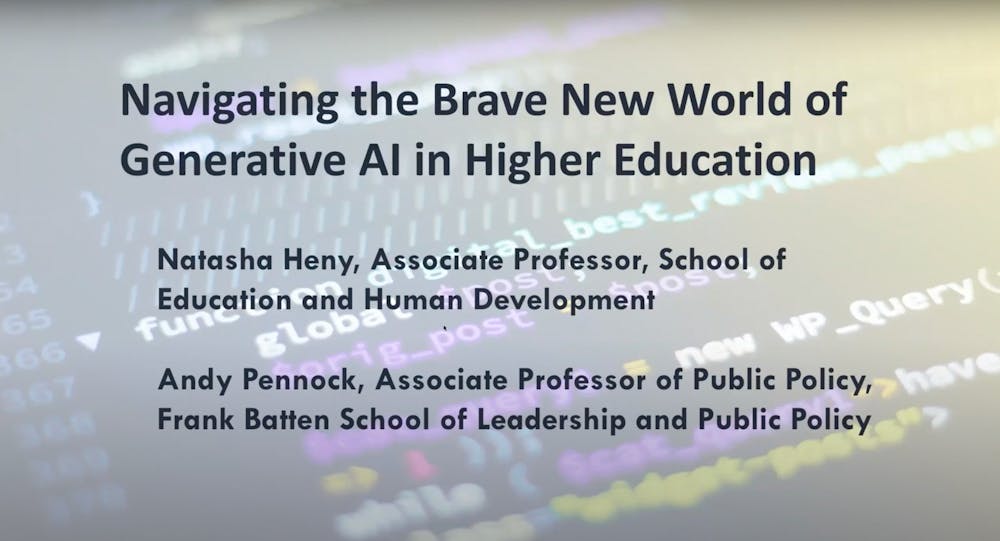The Generative AI in Teaching and Learning Task Force hosted their first town hall session over Zoom Monday in partnership with the College’s natural sciences department. Attendants focused on how generative AI can both benefit and harm the learning experience. The task force aims to collect input from attendees to provide a recommendation to the provost defining the University’s policy towards the technology.
Monday’s town hall kicks off a total of six town halls to be hosted with various schools around Grounds in the coming two weeks.
The GENAI Task Force was assembled to address rising academic integrity concerns associated with generative AI platforms like ChatGPT, a breakthrough platform initially released in November 2022.
ChatGPT grew rapidly, reaching 100 million users in just two months, and can do almost anything from solving math problems to writing academic papers. The Honor Committee has already raised concerns over increased cheating possibilities arising from generative AI, and Gabrielle Bray, chair of the Committee and fourth-year College student, serves as a member of the task force.
Some Committee members were hesitant towards generative AI software, citing a concern for a lack of discernment between real assignments and artificially-generated work. Other members were in support of AI usage, but with strong guidelines and limits.
Andrew Pennock, event host and Assoc. Batten Professor, said AI platforms are becoming incredibly intelligent and far-reaching and students already use them in various ways in and out of the classroom.
“[Chat GPT] has now passed the bar exam,” Pennock said. “It has gotten A’s across a variety of disciplines. So it’s interesting to think about how students are using it.”
The Task Force currently consists of seven members from schools and organizations across Grounds, including Assoc. Education Professor Natasha Heny as an additional event host.
The 40 participants — a mix of students and faculty who registered online — were separated into breakout rooms where they discussed how generative AI will disrupt course content, student learning processes and assessments of student learning.
One breakout session included Assoc. Politics Professor John Echeverri-Gent and Assoc. Public Health Professor Paige Hornsby. Echeverri-Gent specifically said that generative AI platforms may inhibit critical thinking among students.
“I see it as presenting a fundamental challenge in that my goal for a number of my classes is to teach students how to think critically,” Echeverri-Gent said. “I worry that ChatGPT is substituting for their cognitive processes.”
On account of the potentially negative role, Hornsby called for the development of classroom initiatives to accommodate the dominance of generative AI.
“Since AI isn't going anywhere, how can we adjust and accommodate this?” Hornsby said. “It's almost like more has to be done in the classroom.”
Assoc. Statistics Professor Richard Ross said his courses encourage students to work in tandem with AI platforms. In one course, students may use AI to generate code while the students will edit it, while in another course students will generate their own code and an AI platform will edit the code accordingly.
“Students can be thinking about and acting on [generative AI platforms] in an intentional way, as opposed to saying, ‘I don’t know, maybe [generative AI] can help,’” Ross said.
Many participants in data-related fields agreed that AI can boost productivity, including a Neuroscience student who said the technology can compile data sets for experiments and condense a set of bullet points into prose.
Echeverri-Gent added additional ways to get faculty on board to integrate AI in a way that is helpful and beneficial to students.
“Students have enough incentive [to use AI],” Echeverri-Gent said. “We need to figure out a way to get faculty to deal with it, to acquaint themselves [with AI] and to figure out how best to use it in instruction.”
Teachers can use AI to assist with planning lessons and assist professors in their teaching. Similar to Ross’ use of AI with his students, AI can help teachers create an outline for their lessons, which the teacher can then edit accordingly.
Pennock ended the meeting urging students and faculty to continue voicing their thoughts, opinions and recommendations regarding generative AI.
“We need your voices in order to ultimately make our recommendations to the provost,” Pennock said.
The next GENAI Task Force town hall will be held in partnership with the Architecture, Batten, Education and Nursing schools on Wednesday from 12 p.m. to 1:30 p.m. The series of virtual town halls will run through April 4.







